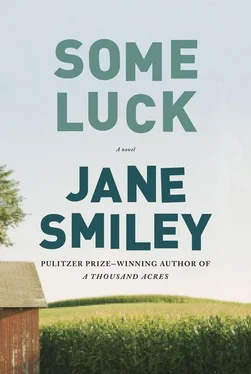“You’re so crazy about Minnie, I must say.”
Mama didn’t seem to like this. Lillian said, “Everyone at school is. She’s fun.”
“Reared on cake and cookies,” said Mama, pulling the last pin out from between her lips and inserting it into the patch. “Well, there’s something to be said for that easygoing way, I suppose.”
Mama did agree with her that the blue and white stripes were very loud, but she gave Lillian thread for smocking — navy and red.
In the afternoons, they sat by the west windows of the school, looking out on the snow and the outhouse, and they sewed while Minnie read aloud. Lillian, who had been sewing since she was eight, was finished with her apron in two days. Jane was not terribly straight in her stitching, so she had to unstitch several times, until she learned to pay attention to what she was doing and stop looking out the window. Lucy was slow, but much more careful than Jane, though she occasionally pricked herself with a pin or a needle. Lois, now nine, tended to forget what she was doing and gawk at Minnie, listening to the story. When Minnie noticed this, she would stop and say, “I can’t go on until Lois stops wasting time.” Lois would go back to sewing. Looking at her seams, Lillian knew she would end up redoing them.
Henry needed help, but he didn’t need that much help, which surprised Lillian. He never pricked himself. He sewed with his tongue sticking out of the corner of his mouth, but he was intent, and when he finished the first long seam, the outer seam of his trouser leg, he shouted, “Hooray!” He found it so inspiring that he carried his trousers home on Friday, and worked on them through the weekend. Papa and Joey might have said something mean, but the sight of him on the sofa, staring at the blue and white stripes and sewing, was enough to shut them up.
Mama said, at one point, “So he wants to sew. Opa always knitted. He knitted himself a sweater every couple of years.”
Since no one ever said a bad word about Opa, Papa kept his mouth shut. Lillian was glad that Frankie was in Ames. On Tuesday, Henry set aside the trousers and started on the vest. When she finished Tom Sawyer , Minnie brought some music from home, not songs for them to sing, but music with swoops and big chords. It was so cold in the school that Jane had to make sure that the stove was stoked at all times, and they had to put socks over their hands under their mittens and three pairs of socks inside their shoes. On the way to school, Lillian had to watch Henry to make sure that his muffler didn’t fall down and expose his nose. But after the projects were done and they were sitting once again on the swaying leafy branches of the maple trees, Lillian thought that that week had been the best of the school year, and that Minnie was the sister that she wanted more than anything.
EVEN AFTER the spring came and the weather warmed up, Rosanna left Claire’s cradle in the front room. The house had been so cold for three weeks that they had all slept there — Lillian on the sofa, Joe on a kind of camp bed, Henry on the floor, and Claire in the cradle at the foot of the stairs. Walter and Rosanna slept in their room, but with all the vents open and blankets over the windows. At the top of the stairs, you could actually feel a warm breeze if the stove was going strong, but away from the door, it was quite chilly. Well, they survived, and now the daffodils were out and it was only a few weeks until the last frost date and time for the corn to go in. The good thing about having the cradle there was that Walter sat down on the couch when he came in and out of the house and chatted with Claire. And whether that was the reason, or whether Claire simply appealed to him because she was calm but alert, Walter didn’t know. Fact was, he liked her. She was his baby.
Rosanna was not unkind to her — her touch was gentle and her look was motherly — but she didn’t make of her what she had of Lillian and Henry (and he couldn’t remember anything about Frank as a baby or Joey, except that Frank was always throwing things and Joey whining). Walter knew that was because the baby wasn’t blonde and looked like a Langdon rather than a Vogel. However, Walter reminded himself, what did it matter to Claire? She was nursed, she was changed, she was carried from place to place. She was set up against the corner where the arm of the sofa met the back, she was given the tiniest bits of mush and applesauce from the tip of a spoon. Lillian sang her songs, and Henry played patty-cake with her, and maybe only Walter noticed a difference. Maybe Rosanna herself didn’t even notice a difference.
But that left an opening for him. What he liked to do was sit beside the cradle while Henry ran around the room in his silly striped suit (which he was wearing into rags) and get her to laugh — not by touching or tickling her, but by turning his head away and turning it back, opening his mouth and slamming it closed, sticking out his tongue and pulling it in, putting his hands over his face and pulling them away again. She laughed and laughed, and he said, “Clairy, Clairy, Clairy, she’s so merry!” and then laughed himself.
SCHOOL HAD HARDLY even begun when Lawrence showed up at Frank’s tent and suggested they go to Chicago for Labor Day weekend. He was bored with his classes.
Frank said, “We’ve been in class one week.”
“I know. But I took a look at the syllabus.”
“You’re supposed to look at the syllabus and buy the books.”
“Well, I try not to.”
The Flying Cloud was parked on the bridge. Frank climbed up the bank, brushed off his trousers, and said, “You need to wash this baby.” Somehow, though he was two years younger than Lawrence, he had become the older brother. But a nice older brother — no kicks, no slaps, no punches, no yelling, just advice. For example, he had told Lawrence to get rid of Gertie Elkins, and he had. Gertie Elkins had had “gold digger” written all over her, and she had said the same thing of Frank, so Frank had told her, “What you see is what you feel, baby. Whores are cheaper than you.” He said, “Is there a game?”
“Not unless we stay till Tuesday. There’s a doubleheader Monday against the Pirates.”
“I have class Tuesday.”
They got into the car. Sometimes Frank thought that his real friend was the car, not Lawrence.
Lawrence said, “Maybe Diz’ll pitch.”
“Dizzy Dean is done for,” said Frank.
“But I like to see him anyway. And—”
“And what?”
“I want to see the communists.”
“Julius and Eloise?”
“I miss them.”
“They’re about to be drummed out of the Party, Julius is such a Trotskyite.”
“I would like to see them even if they were only socialists. Eloise is sexy.”
“She’s thirty-four years old.”
“Myrna Loy was born in 1905.”
Frank said, “She’s too old for you, too.”
Julius and Eloise lived in a better place than they had — in Rogers Park, just south of Evanston, not where the big houses were, but not far from the lake, either. They had three bedrooms now, and he had taken Lawrence to visit them twice already. Anyway, they had plenty of hot water and it was cheap to stay there. Lawrence loved the communists. He had let Julius take him to a meeting and talk to him about world revolution, which Julius was happy to do, even though Lawrence was obviously petit-bourgeois scum and, as Frank said to him, “He will execute you after the revolution, you know that, don’t you?”
“Not if I give him the car.”
It took about five breezy hours to get there, but Eloise wasn’t happy to see them. She took a long time to come to the door, and then went straight back to her typing. The apartment was a mess, and the sheets were sitting folded on the unmade bed of the guest room. The sound of typing stopped, and then she appeared in the doorway, her cigarette in her hand. She said, “A fellow we know from the Party in England was here for a week. He left yesterday morning, but with all these things in Europe, I haven’t had a moment.”
Читать дальше












